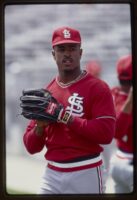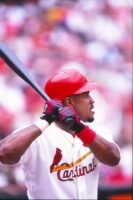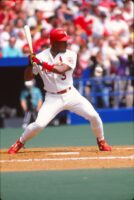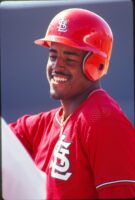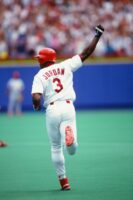Inductees
Brian Jordan

Born: March 29, 1967
He remembers it as if was yesterday: The clubhouse meeting called by the veteran catcher. The maddening spring of a club trying to adjust to a new manager. The sense that everything was going off the rails.
There Brian Jordan was in 1996, his fourth season in the big leagues with the St. Louis Cardinals, and wanting to do something to change the narrative.
No way had he given up his National Football League career to hang out in the middle of the National League standings. He had come too far for that – from the rough sandlots of Baltimore, from rejecting an offer to play NCAA Division I football and from using an exhibition between his college and the local Triple-A club to enhance his stock.
“I was one of those guys that played with emotion. So I decided I was going to get the fans pumped up – doing the unthinkable, like going first to third,” Jordan said. “After that meeting, I put it on myself to pick up the team.”
Jordan certainly helped power a turnaround that put the Cardinals on the brink of the World Series that season, kick-starting a 20-year golden era for St. Louis. Personally, it marked one of his best seasons of an impactful, 10-year journey (seven in the big leagues) in the organization, and that is why the Missouri Sports Hall of Fame proudly inducted Jordan with the Class of 2019.
Jordan was a rare two-sport professional athlete – he was an NFL safety with the Atlanta Falcons from 1989 to 1991 and played pro baseball from 1988 to 2006 – at a time when Bo Jackson and Deion Sanders were the only other athletes to pull the trick.
His best season with the Cardinals was 1996 when Jordan finished eighth in NL MVP voting, as he helped St. Louis reach the postseason for the first time since 1987. He finished with a career-high 36 doubles, 17 home runs and 104 RBI along with 22 steals, with the Cardinals advancing to Game 7 of the NL Championship Series.
Call it quite a surge for those Cardinals, who fell to 17-26 on May 21, the first spring in town for manager Tony La Russa (MSHOF Legend 2015).
The turnaround came after catcher Tom Pagnozzi led a team meeting. The Cardinals went 76-53 the rest of the way, including in the postseason. Jordan hit .321 in the season’s second half, including six-RBI, two-home run game against the Chicago Cubs.
For Jordan, he badly wanted to win for the retiring Ozzie Smith (MSHOF Legend 2011, and his fire burned to restore order following back-to-back losing seasons.
Understand, Jordan had been a first-round draft pick in 1988 and ended his NFL career after the 1991 season b signing a big-league deal for a reported $1.7 million. It was understandable, considering Jordan had played only 36 minor league games in 1989 and 1990 after wrecking an ankle in the college football Senior Bowl.
“We were riding high and turning the corner,” Jordan said of the 1996 Cardinals. “It was just a fun time. I remember hitting home runs and jumping up and down at the plate and in the dugout.”
The 1996 Cardinals sparked a run of 13 postseason appearances over the next 20 seasons.
Jordan had taken the long road to St. Louis. As a high school senior at Milford Mill Academy in Baltimore, he chose the University of Richmond (Va.) over the University of Maryland in order to be a two-sport athlete. Eventually, he was approached by a Cardinals scout after an exhibition between Richmond and the local Triple-A Braves’ affiliate.
“I told him I would sign on one condition,” Jordan said. “I needed to graduate first and wanted to play my redshirt junior year in football.”
In his seven seasons in St. Louis (1992-1998), Jordan had 84 home runs, 122 doubles, 24 triples, 367 RBI and stole 86 bases.
Overall, Jordan was a career .282 hitter with 184 home runs and 821 RBI as he also had stops with the Braves, Los Angeles Dodgers and Texas Rangers. He helped Atlanta win the NL pennant and reach the World Series in 1999 and also helped the Braves to the playoffs in 2000, 2001 and 2005.
“I tell everybody still today that I wish I could have been a Cardinal for life,” Jordan said. “There’s not better baseball town than St. Louis. That sea of red … wow, I was just fortunate to be a part of it for seven years.”
